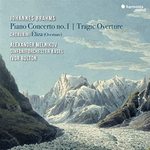|
Back
08/24/2021
Johannes Brahms: Tragic Overture in D minor, opus 81 – Piano Concerto n° 1 in D minor, opus 15
Luigi Cherubini: Eliza (ou, Le Voyage aux glaciers du Mont Saint-Bernard): Overture
Alexander Melnikov (piano), Sinfonieorchester Basel, Ivor Bolton (conductor)
Recording: Teldex Studio, Berlin, Germany (June 2020) – 74’10
harmonia mundi HMM 902602 (distributed by PIAS) – Booklet in French, English and German

   
Peaks, whether they be of mountains or emotions, appealed to the great Romantics. The craggy art of Caspar David Friedrich, the stormy prose of the Shelleys, Polidori, and Byron composed during ill weather in Switzerland, the soaring harmonies of Beethoven, Schumann and Brahms, all bespeak the power of peaks and the emotions that lead us to experience life at its greatest intensity.
A collection celebrating those Romantic peaks in music is being released this month by harmonia mundi featuring the Sinfonieorchester Basel, under the direction of Ivor Bolton. The centerpiece of the recording is one of the musical peaks of the Romantic era, Brahms’ Piano Concerto n° 1 in D minor with pianist Alexander Melnikov. Like the orchestra and its conductor, Melnikov is interested in historically informed performance practice, not exactly a Romantic approach, but one well worth hearing as audiences expand their appreciation of how music performed today reflects the intentions and experience of composers who lived years, even centuries, before.
Other selections in this recording are Brahms Tragic Overture and Cherubini’s Overture to Éliza, ou Le Voyage aux Glaciers du Mont Saint-Bernard,, a comic opera in two acts premiered in Paris in 1794. Of the three Romantic selections in this album, the Cherubini overture was of greatest interest to me for reasons which will be provided later in this review.
The recording opens with Brahms’ Tragic Overture, a bright, clean reading, happily lacking the murkiness and unfocused introspection that sometimes accompanies this work. Bolton’s perspective is architectural in scope and stability, with balanced dynamics and clear articulation of themes. This approach extends as well to the Brahms Concerto, where the attention of both conductor and soloist is fixed on elegance and precision more than Romantic abandon, at least in the first movement.
Bolton’s “Maestoso” is truly stately, though (at over 50 minutes in length) the pace was just a little too slow for my taste. In the rare for its time signature of 6/4, the first movement is astonishingly mature, considering Brahms was only 25 when he composed it. As a young man, his friend and advocate, Robert Schumann, composed symphonic music full of light, joy in nature and high spirits. At an even younger age, Brahms was already composing music far beyond his years, music that recalls dim, gas-lit parlors rather than spring meadows. The unexpected dark trills in the strings in the first movement assert themselves like the growls of wild forest creatures. In its first two performances with Brahms as soloist, the work was soundly hissed and jeered, so much so that his publisher ended their relationship. And yet today, we listen with amazement and gratitude. The composer seizes our attention, will not let go, and we are helpless to resist.
As part of his respect for the history of this work, Melnikov selected an 1859-era Blüthner piano, almost an exact contemporary in age to the instrument Brahms would have used in composition and performance. While this reading benefits from the historical context it establishes, the piano, to my ear, yields unequal musical results. Its tone and flexibility are richly rewarding in the Concerto’s many passages of sweeping grandeur. But in the more tender moments, when all is hushed except the whisper of the keys, I found the sound choppy and dry rather than lyrical. Though it may be a restoration masterpiece, the antiquarian Blüthner does not have the resonance of today’s finest pianos, but it offers us a glance into the advantages and disadvantages of keyboard instruments in Brahms’ time. Melnikov’s impressive musicianship, however, assure us that the overall presentation of this dark, but strangely radiant Concerto remains integrated and comprehensible to listeners no matter where they sit in the historicity debate. While not being the definitive Brahms’ First, this performance deserves to be heard for a unique point of view and some splendid playing by orchestra and soloist.
The album concludes with an overture to an opera by Luigi Cherubini which is known primarily to music historians. The last half of the 18th century was a kind of golden age of opera in Western Europe, yet as tastes have changed, few of these works (mostly Mozart’s) remain in repertoire today. Even operas by such luminaries as Haydn and Salieri have fallen by the wayside. Yet, their contributions to composers of the next generation were incalculable. Growing up in the opera-crazy town of Bonn at that time was the young son of a court singer, much impressed by the theatricality, humor, and musical inventiveness of music drama. The impact of the hundreds of operas performed in his hometown, and the scores he studied as a young music student, made an indelible imprint on the young Ludwig van Beethoven, who left Bonn for Vienna in 1791, bringing with him that unique musical education.
Cherubini met Beethoven in Vienna about the time that the latter’s opera, Fidelio was premiered in the Theater an der Wien. The Italian didn’t think much of Fidelio, so different from the frivolous, fun-loving operas of the time, but Cherubini made a huge impression on the younger composer. As late as four years before his death, Beethoven was asked who was his favorite contemporary composer. “Cherubini!” he replied. In this album, we get to hear a sampling of Cherubini’s colorful and charming compositional style in a zesty performance by the Basel ensemble. What the overture lacks in melody and rhythmic variety, it makes up for in energy and imagination, two qualities aptly captured in Bolton’s adroit direction.
Linda Holt
|